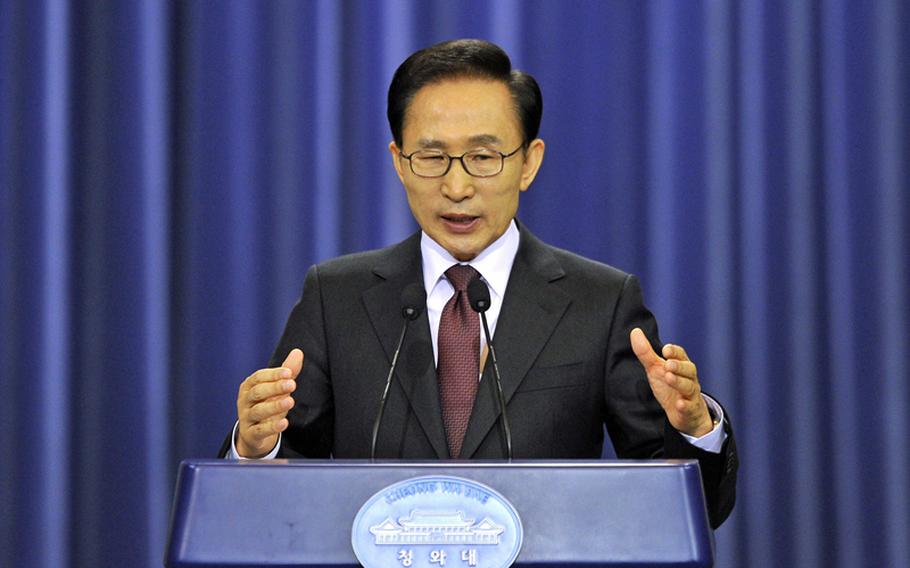
South Korean President Lee Myung-bak gives a speech Feb. 22, 2012, to mark his four-year anniversary in office. (Jung Yeon-je/AP)
SEOUL — South Korea’s president said Wednesday that North Korea continues to try to influence politics in South Korea, but the regime’s traditional tactics aren’t as effective as they have been in the past.
“I think that North Korea is taking the general strategy of stirring up controversy in South Korea,” Lee Myung-bak said during a press conference held to mark his four-year anniversary in office. “I think the South Korean society has matured so that it is no longer vulnerable to these strategies and ploys.”
He added: “I do not think that North Korea and South Korea have anything to gain from stirring up conflict, and this does not help in improving inter-Korean relations.”
Lee’s remarks came at a time of uncertainty on the peninsula following the sudden death of former dictator Kim Jong Il from a heart attack in December. Little is known about the intentions and capabilities of his son and successor, Kim Jong Un, who experts believe may have played a role in launching twodeadly attacks against the South in 2010.
The South Korean president did not directly mention either of the Kims, nor the 2010 attacks, saying only that the North “is faced with a great opportunity to make changes for itself for the better.”
“I think we need to be patient, and we need to wait and hope that inter-Korean relations will progress,” he said, adding that his government is willing to resume dialogue with the North if it is sincere.
North Korean and U.S. envoys are scheduled to meet in Beijing on Thursday to discuss further talks about North Korean denuclearization. However, North Korea threatened “merciless retaliatory strikes” to a South Korean exercise on its border islands that took place on Monday, though it took no action.
The U.S. and South Korean began a joint, five-day anti-submarine exercise in the Yellow Sea on Monday, and are scheduled next week to begin the annual Foal Eagle field exercise, with approximately 11,000 U.S. troops and as many as 200,000 South Korean troops participating. The Key Resolve command post exercise, scheduled to run Feb. 27 through March 9, will involve 2,100 U.S. troops.
North Korea has traditionally responded to the spring exercises with condemnation and threats of war.
Lee, whose administration has been tainted by corruption scandals, spent much of his time defending himself on domestic issues such as his economic record and the appointment of officials affiliated with South Korea’s massive conglomerates.
He reiterated his support for a planned naval base on Jeju island as “essential to national security.” The proposed base is being built for the purpose of responding more quickly to North Korea provocations and to police shipping lanes, but critics say it would antagonize nearby China and would essentially become an outpost for the U.S. military.
Lee also suggested that his administration would continue to press China not to return North Korean defectors who were captured in China in recent weeks to their homeland, where they could face harsh punishment or execution.
“As long as these defectors are not criminals, the Chinese government needs to handle this issue under international rules and standards,” Lee said.
Stars and Stripes’ Yoo Kyong Chang contributed to this story.